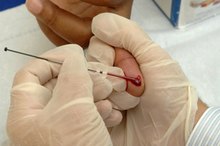Why Do People Pass Out While Giving Blood?
Blood donation has several benefits for those who have serious injuries and diseases. The Mayo Clinic reports that each blood donation can help up to three people since donor centers divide whole blood into platelets, red blood cells and plasma. Because donation involves the removal of blood from the circulatory system, some people pass out while giving blood or after the blood donation process.
Blood Donation
During the donation process, a phlebotomist or nurse inserts a needle into the vein of the donor. The collection process itself takes 8 to 10 minutes, according to the American Red Cross. Blood collection continues until 1 pint of blood has accumulated. After this procedure, the phlebotomist or nurse puts a bandage on the donor’s arm to stop any bleeding.
- During the donation process, a phlebotomist or nurse inserts a needle into the vein of the donor.
- After this procedure, the phlebotomist or nurse puts a bandage on the donor’s arm to stop any bleeding.
Effects
Can You Drink Coffee Before Donating Blood?
Learn More
During the blood collection process, blood volume decreases, causing a sudden drop in blood pressure. This sudden drop causes some people to pass out while they give blood. Sudden decreases in blood sugar level also cause fainting during blood donation. "Men’s Health" magazine indicates that blood donation also has an emotional component. During emotional stress, the body directs blood flow to the muscles to prepare for the flight or fight response to danger. This diverts blood from the brain, increasing the risk that someone will pass out during the donation process.
- During the blood collection process, blood volume decreases, causing a sudden drop in blood pressure.
Identification
Some people experience symptoms before they pass out. The Heart Rhythm Society defines these symptoms as presyncope. Presyncope symptoms include sweating, nausea, lightheadedness, dizziness, abdominal discomfort, headache, confusion, heart palpitations and difficulty speaking. If you experience these symptoms while donating blood, notify a donation center professional immediately.
- Some people experience symptoms before they pass out.
- The Heart Rhythm Society defines these symptoms as presyncope.
Prevention/Solution
Side Effects From a Blood Transfusion
Learn More
Blood donors should take several steps to reduce the risk of passing out during the donation process. The American Red Cross recommends drinking plenty of fluids and maintaining a diet high in iron before a donation appointment. Drinking fluids will keep blood volume at normal levels, while iron consumption will counteract the loss of iron that occurs during donation. After giving blood, eat a snack that contains sugar to replace the blood sugar lost during the donation process. This will help prevent fainting after blood donation.
- Blood donors should take several steps to reduce the risk of passing out during the donation process.
Warning
Some people have an increased risk for passing out because of medical conditions that affect the heart, endocrine system and nervous system. These conditions include diabetes, hypoglycemia, anxiety, irregular heartbeat, panic disorders, heart blockages and dehydration. Discuss your medical history with a physician or donation center representative to determine if blood donation is appropriate.
Related Articles
References
- Mayo Clinic: Did You Know?
- American Red Cross: Donation Process
- DeAnza College: Blood Donation FAQs
- Heart Rhythm Society: Signs and Symptoms
- Uche E, Adediran A, Damulak O, Adeyemo T, Akinbami A, Akanmu A. Lipid profile of regular blood donors. J Blood Med. 2013;4:39-42. doi:10.2147/JBM.S42211
- Van jaarsveld H, Pool GF. Beneficial effects of blood donation on high density lipoprotein concentration and the oxidative potential of low density lipoprotein. Atherosclerosis. 2002;161(2):395-402. doi:10.1016/S0021-9150(01)00638-4
- Meyers DG, Strickland D, Maloley PA, Seburg JK, Wilson JE, Mcmanus BF. Possible association of a reduction in cardiovascular events with blood donation. Heart. 1997;78(2):188-93. doi:10.1136/hrt.78.2.188
- The United Network For Organ Sharing
- Transplant Living, a Division of UNOS. TransplantLiving.org
Resources
Writer Bio
Leigh Ann Morgan began working as a writer in 2004. She has extensive experience in the business field having served as the manager of a $34 million rental property portfolio. Morgan also appeared as a guest on an episode of National Public Radio's "Marketplace Money" in 2005.









